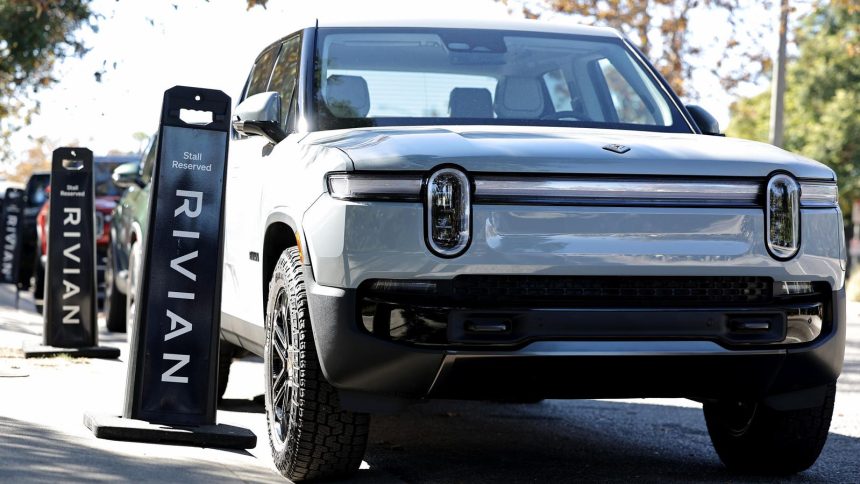Rivian, the electric vehicle (EV) manufacturer and Tesla competitor, experienced a remarkable surge in its stock price on Friday, marking its most significant single-day percentage gain since its initial public offering (IPO) in November 2021. The stock soared by 24.5%, reaching $16.49 per share, surpassing its previous record set in June of the same year. This impressive rally also propelled Rivian’s intraday share price to its highest level since July 23, 2024. The surge in investor confidence followed the release of Rivian’s fourth-quarter car delivery figures, which exceeded Wall Street expectations.
The company delivered 14,183 vehicles in the final quarter of 2024, outperforming the consensus analyst estimate of approximately 13,000 vehicles, according to FactSet data. Furthermore, Rivian’s total deliveries for the entire year reached 51,579, marginally exceeding the projected 51,000. This positive news, coupled with a broader rally in the automotive sector, contributed to Rivian’s exceptional stock performance. Other major American automakers, including Ford, General Motors, and Tesla, also experienced gains on Friday. Ford and General Motors both reported their strongest annual sales since 2019, boosting investor sentiment and driving their stock prices higher.
Tesla, the world’s largest automaker, rebounded from a 6% decline on Thursday following its fourth-quarter delivery data, which fell short of analysts’ predictions. Despite this initial setback, some analysts argued that the delivery figures were a minor blip for Tesla, and the stock recovered strongly on Friday, marking its best day since mid-November. The overall positive market sentiment, fueled by the automotive sector’s performance, also lifted the broader market indices. The S&P 500 and the tech-heavy Nasdaq both rose by more than 1% on Friday.
Rivian’s stock has exhibited remarkable resilience and growth since the recent Presidential election, gaining 56%. This performance outshines all but two S&P 500 stocks: Tesla, with a 63% increase, and Palantir, a defense contractor specializing in artificial intelligence, which also saw a 56% gain. This robust post-election return for Rivian contrasts sharply with initial analyst concerns regarding President-elect Trump’s purported intention to curtail federal EV subsidies. These concerns, which initially triggered an 8% drop in Rivian’s stock price following the election results, appear to have been largely allayed by the company’s strong performance and promising delivery figures.
Despite these positive developments, it’s crucial to acknowledge the long-term challenges Rivian continues to face. While the recent stock rally is encouraging, the company’s share price remains significantly below its peak shortly after its IPO, having declined by 90%. This sharp drop underscores the volatility and risks inherent in investing in high-growth, pre-profitability companies like Rivian. Furthermore, the company’s 52,000 vehicle deliveries in 2024 represent a mere 3% of Tesla’s 1.79 million deliveries during the same period. This disparity in scale highlights the significant gap between Rivian and its established competitor. Rivian’s market capitalization of $17 billion is also dwarfed by Tesla’s $1.3 trillion valuation, underscoring the significant difference in market perception and investor confidence.
Rivian’s financial performance also presents ongoing challenges. The company has yet to report a profitable quarter since going public, consistently posting losses measured by EBITDA (earnings before interest, taxes, depreciation, and appreciation). In each of its 14 quarters as a public company, Rivian has reported an EBITDA loss of at least $558 million. This persistent lack of profitability raises concerns about the company’s long-term sustainability and its ability to compete effectively in the highly competitive EV market. Looking ahead, Rivian’s success will depend on its ability to ramp up production, control costs, and ultimately achieve profitability.
Despite these challenges, Rivian has secured significant backing from institutional investors and government entities. The company received a $5 billion investment from Volkswagen in May 2024 and a conditional loan of $6.6 billion from the Department of Energy in November for the construction of a manufacturing plant in Georgia. These investments demonstrate confidence in Rivian’s long-term potential and provide crucial financial resources for its expansion plans. Rivian captured approximately 4% of the U.S. electric vehicle market in 2024, according to Morgan Stanley research. This market share, while relatively small compared to Tesla, indicates growing consumer interest in Rivian’s vehicles. However, the potential repeal of the $3,750 federal tax credit for EV purchases, a policy reportedly favored by the incoming Trump administration, poses a significant threat to Rivian and other EV manufacturers. This policy change could dampen consumer demand by effectively increasing the purchase price of EVs. Navigating this potential headwind will be crucial for Rivian’s continued growth and success.



